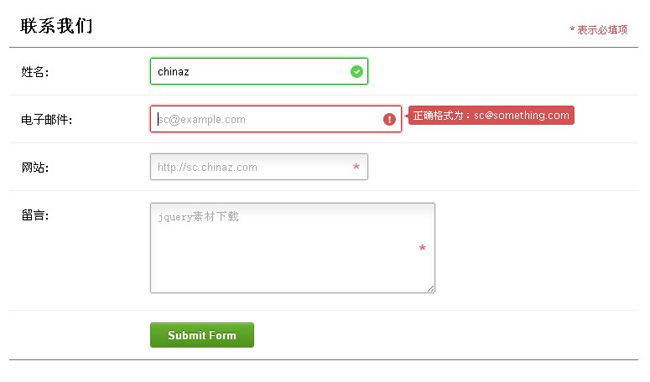html5 client form validation

HTML5 client form verification, client verification, will be widely used in shopping malls. When you register as a member, the client will verify the form data. If it does not comply, it will not be sent to the backend for verification. HTML5 client verification, php Chinese Recommended download!
Realization effect:
HTML5 client form verification, client verification, will be widely used in shopping malls. When you register as a member, the client will verify the form data. If it does not comply, it will not be sent to the backend for verification. HTML5 client verification, php Chinese Recommended download!
All resources on this site are contributed by netizens or reprinted by major download sites. Please check the integrity of the software yourself! All resources on this site are for learning reference only. Please do not use them for commercial purposes. Otherwise, you will be responsible for all consequences! If there is any infringement, please contact us to delete it. Contact information: admin@php.cn
Related Article
 Implementing Client-Side HTML5 Form Validation
Implementing Client-Side HTML5 Form Validation
04 Jul 2025
Form verification can be achieved through built-in HTML5 features, without relying on JavaScript. Use required, min/max, and pattern attributes to ensure the legality of input; use the browser's default error prompts or custom content; improve the interactive experience through the CSS's :valid/:invalid pseudo-class; at the same time, it is necessary to pay attention to compatibility, and combine back-end verification and testing to ensure cross-browser compatibility.
 Implementing client-side validation with HTML5 form attributes.
Implementing client-side validation with HTML5 form attributes.
02 Jul 2025
Form verification can be achieved through HTML5 built-in properties without JavaScript. 1.Required ensures that the field is not empty, and is suitable for required items such as username; 2. Pattern is combined with regular control input format such as zip code, and an error is prompted through title; 3. Type extends verification data types such as email, url and number, and combines min/max to limit the numerical range, but pay attention to the differences in browser compatibility.
 How to implement client-side form validation using HTML5 attributes?
How to implement client-side form validation using HTML5 attributes?
11 Jul 2025
Form verification can be implemented through HTML5 built-in properties. 1. Use required to ensure that the data format is required; 2. Verify the data format through type and pattern, such as email, url and custom regular expressions; 3. Use minlength, maxlength, min, and max to limit the character length and value range; 4. Automatic verification is performed when the browser submits by default, and JavaScript can also be used to manually trigger the checkValidity method; the compatibility of different browsers requires attention, and some old versions or mobile terminals have limited support.
 HTML5 form validation guide
HTML5 form validation guide
14 Jul 2025
Form verification can improve efficiency through HTML5 native mechanism. 1. Use the required attribute to ensure the required fields; 2. Use the input type (such as email, number) and pattern attributes to verify the data format; 3. Use the setCustomValidity() method and CSS to adjust the error prompts and styles to optimize the user experience.
 Form Validation on the Client Side
Form Validation on the Client Side
08 Mar 2025
Client form validation is crucial – it saves time and bandwidth and provides more options to point out where users make mistakes when filling out forms. That being said, this doesn't mean you don't need server-side verification. Users visiting your website may have used an old browser or disabled JavaScript, which will break client-only verification. Client and server-side verification complement each other, so they really should not be used independently. Why is client verification important? There are two good reasons to use client authentication: It is a quick way to verify: if something goes wrong, an alert will be triggered when the form is submitted. You can safely display only one error at a time and focus on the wrong fields to help ensure that the user correctly fills out all the detailed letters you need
 H5 Client-Side Form Validation Performance
H5 Client-Side Form Validation Performance
21 Jul 2025
The performance optimization of form verification requires: 1. Control the trigger frequency and use throttling or anti-shake to avoid frequent verification; 2. Reduce unnecessary DOM operations and reuse the prompt area; 3. Reasonably use the built-in verification attributes of H5 to improve efficiency; 4. Unified verification is provided when submitting the main push, supplemented by real-time prompts for key fields; 5. The mobile terminal adopts lightweight prompt methods such as Toast. These methods can help you ensure your experience while improving performance.
 Implementing HTML5 Form Validation Techniques
Implementing HTML5 Form Validation Techniques
30 Jul 2025
Form verification can be achieved through HTML5 built-in attributes, CSS feedback, JavaScript control and prompt optimization. 1. Use required, type, min, max, pattern and other properties to achieve basic verification; 2. Use the :valid and :invalid pseudo-classes to cooperate with CSS to improve user feedback; 3. Use JavaScript to achieve flexible control through checkValidity() and setCustomValidity() methods; 4. Optimize prompt information and consider old browser compatibility. Front-end verification needs to be combined with back-end verification to ensure data accuracy.
 Happier HTML5 form validation in Vue
Happier HTML5 form validation in Vue
02 Apr 2025
It's kind of neat that we can do input:invalid {} in CSS to style an input when it's in an invalid state. Yet, used exactly like that, the UX is pretty bad.
 HTML5 form validation custom error messages
HTML5 form validation custom error messages
12 Jul 2025
How to set custom error message with JavaScript? 1. Use the setCustomValidity() method combined with native form verification, and set prompts for specific input conditions through JavaScript. For example, when the username is less than 3 characters, it prompts "the username needs at least 3 characters"; 2. Combine HTML attributes (such as required, pattern) and JS supplementary verification, and return targeted prompts according to different reasons for verification failure. For example, when the email format is inconsistent, "the email must end with @example.com"; 3. Note that after each verification, you need to call setCustomValidity('') to clear the error message and select the appropriate event (input and i)


Hot Tools

HTML5 Canvas heart fluttering animation special effects
HTML5 Canvas heart fluttering animation special effect is a generated animation that can be directly opened with a browser to see a heart.

H5 panda bouncing game source code
HTML5 Mobile Panda is also a crazy game source code. Game description: Press and hold the screen to adjust the strength of the panda spring and jump to the stone pillar. The game ends if you fall into the river.

HTML5 Valentine's Day box animation special effects
Based on svg, draw animations of opening love box gifts on Valentine's Day, and special effects of love box animation.

H5 3D rolling ball game source code
HTML5 cool 3D ball rolling mobile game code download. Game introduction: A colored ball rolls, and the current track of the colored ball is controlled by dragging it with the mouse or the touch screen of the mobile phone. This is a simple and easy-to-operate mobile game source code.





